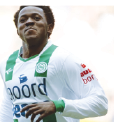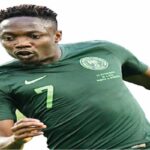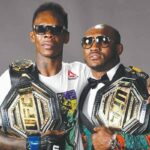Former Nigeria midfielder Femi Ajilore, a 2008 Olympics silver medallist, talks about playing football in Europe, and being part of the Nigeria U-23 side that lost to a Lionel Messi-inspired Argentina in the football final of the Beijing 2008 Olympics, in this interview with PETER AKINBO
How is life after retirement?
Life’s good. Whatsoever challenges one might face, in as much as you have important things doing that make you happy, then life is good.
What do you do now?
I have been doing a lot. I am an entrepreneur; I have some football academies I run, so, I have been very busy. Presently, I am doing a lot for grassroots development through my football academy, The Femi Ajilore Football Clinic, where we develop and encourage kids’ participation in sports, football precisely. One of the programmes we facilitate is the Kiddies Football League from age 6 to 13 and our maiden edition was concluded a few months ago.
Do you sometimes feel like going back to playing football?
Of course, it’s a natural feeling but you can’t shy away from the fact that in as much as the mind is willing, the body cannot do exactly what the mind is willing to do. So, on that note, I still play football, I might not be playing it like a professional but I play. I train a lot of people through the academies I run, so I am still in the football sector and of course, with my sporting experience, I have been privileged to be the Sports Director of a political party as well.
Are you considering going into coaching?
I have my coaching certificate already and I still want to pursue more certifications to add to my coaching knowledge. Would you consider coaching a team in the local league or overseas?
Would you consider coaching a team in the local league or overseas?
I think time will tell, but for now, I want to do things one after the other. I believe it can happen but my primary aim is to be a Sports Director or Technical Director of one of our NPFL clubs, with the vast knowledge of the game that I have. It is natural after being a player to have coaching skills, of course, sometimes it’s not enough, and that is why I engage myself in some coaching and leadership programmes.
As a young star, what was it like travelling to Europe for the first time?
It was everything to me then, a dream come true, not just going to Europe but also to achieve what I set out to do.
What were the differences in football in the countries you played in?
Well, in Denmark, the style of play was more physical, as a player, you had to be physical to play in the Danish league. In Holland, you need to have good techniques to play in the league, even though the physical aspect is also important, but they emphasise on techniques, you don’t see most of their players running the way they do in Denmark. But in Germany, it’s almost like combining the two, you must have both to play in the league. Each of these countries gave me an opportunity to experience another dimension of the game which I enjoyed and it made me more experienced.
At the 2008 Olympics football final, you faced Argentina in the final, how did it feel going up against Lionel Messi?
Olympics are more like the World Cup. It was really big, especially when you had teams like Brazil, Argentina, Netherlands, the big football countries at the tournament. To play in the final meant a lot to me, it’s a huge achievement but it would have been perfect if we managed to beat them (Argentina) in the final. Second (position) isn’t bad as well, it’s a good consolation and of course, I feel good about it. Looking back at the Olympics, I feel blessed to have had such an experience. And facing Messi was a normal thing for me, because at that time, a lot of us were professionals and had been playing against each other at club level at one point or the other, but playing in the final was the bigger thing for me.
How did it feel losing by a lone goal to the Argentines?
It was very painful. I never believed we were going to lose the game, knowing that we lost to them at the final of the U-20 World Cup in 2005 even though I wasn’t in that Nigeria squad due to injury. Meeting them again in the Olympics final gave us a chance to revenge the defeat. In my mind, I believed there was nothing they would do, that we were going to take the day. Sometimes in football, if you don’t take your chances and your opponents are able to take theirs, it will separate the winners from the losers. It was like that for us, we had the opportunity of winning, but we were unable to take our chances. They had one huge one and they managed to convert it and I think that was just the difference.
Do you still have your Olympic silver medal with you?
Yes, I have it in my living room. It feels very good to see it and hold it from time to time. My kids ask about it and I tell them what it is and what it means. They play in the kids division now and they’ve also managed to win some medals, so, they know the importance of winning now, although, they still don’t understand the magnitude of the Olympic Games and what it means to win a silver medal.
Who was your best friend in the Nigerian Olympics team?
I got along with almost all the players in the team; I liked practically everybody in the team. On the field though, I got along well with Sani Kaita because we both anchored the midfield so we communicated well a lot to do well for the team.
Did you ever play for a team where someone didn’t like you and it showed on the pitch?
It actually happened in Holland at Groningen. It almost got to a point of exchanging blows; it was Marcus Berg, one of Sweden’s top players then. Though we were friends, sometimes when you’re working really hard and both of us have a point during training; it is always like a competition. When I go hard on him, he’ll also go hard on me and when he starts, I just can’t take it from him. But we managed the situation then.
Did you experience racism while abroad?
Yes, but I didn’t experience it to the extent of exchanging words with people or feeling very bad about it. I think it’s a natural thing abroad. When you come in as a foreigner and you earn more than some of the local players, who the fans like and then take their position, naturally, there’s no way they will like you the way they do their fellow countryman. I was able to manage some of those situations, even on the field, but like I said, I was privileged not to see the ugly side of it.
What was your happiest moment in football?
I have some very good memories in my career. Playing at the final of the Olympics is one of them, starting a game like that in a stadium of 90,000 capacity is a dream for every player because the whole world is watching. That was one of my happiest moments, even though we didn’t win the gold medal. It’s still a memory I can never forget. Another one was winning the Best Central Midfielder award in Denmark.





